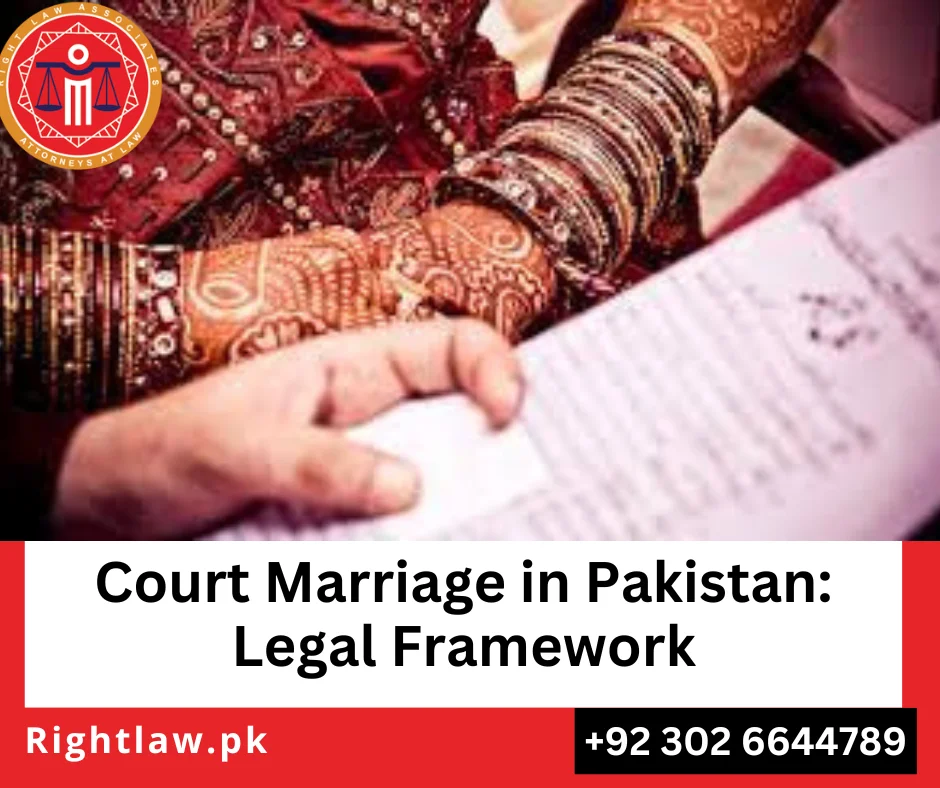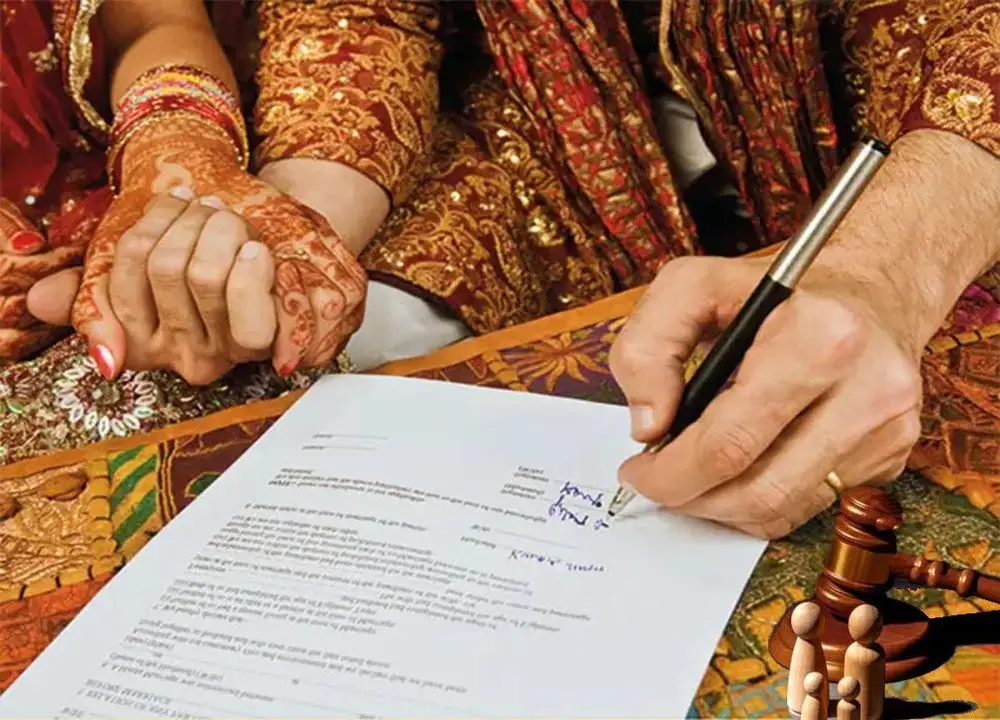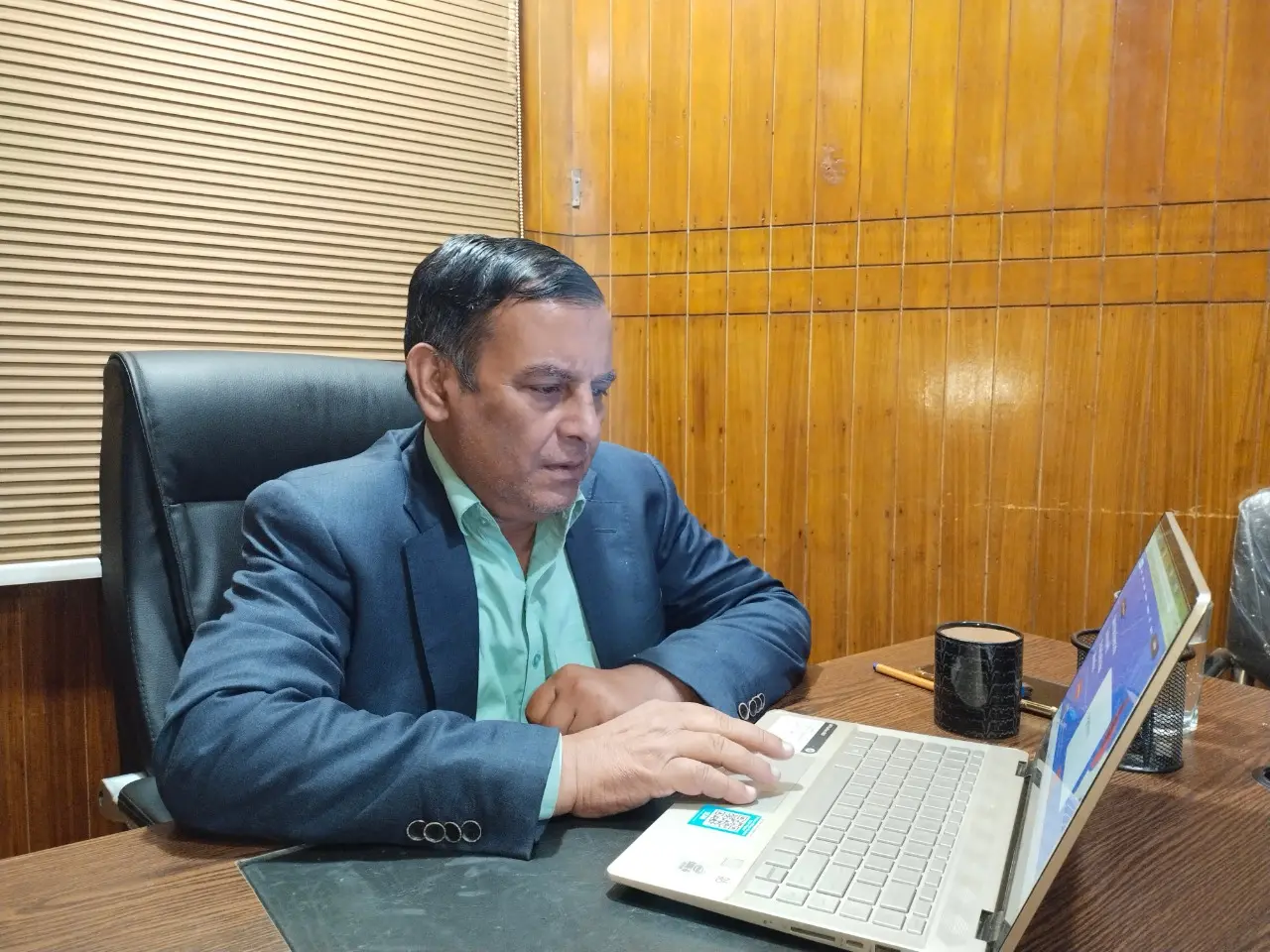- Karachi
- Lahore
- Islamabad
- Leads, UK
- Reading, UK
- Quebec, Canada

Court marriage in Islam and Islamic countries has been gaining prominence, particularly in urban areas such as Pakistan, where it offers a legal framework that aligns with the law of the land. While traditional nikah ceremonies are often conducted by Islamic scholars or local religious leaders, court marriage ensures that the union is recognized both legally and religiously. However, a court marriage must adhere strictly to the principles of Shari’a law, including the consent of both parties, the presence of witnesses, and the proper execution of the Nikah contract, to be considered valid in Islam.
Islamic law, or Shari’a, sets out clear guidelines that govern the sanctity of marriage, including the issuance of a nikah (marriage contract) which is considered fundamental. Despite the legal formalities associated with a court marriage, the Islamic conditions for a valid nikah such as mutual consent of both parties, the presence of witnesses, and the offering of mahr (dower) remain inviolable.
One of the key reasons for the burgeoning trend in court marriages is the increasing awareness and emphasis on legal recognition. This form of marriage ensures that the marital union is officially documented, which is particularly significant in societies where legal and fiscal issues come to the fore. In Pakistan, for instance, a court marriage that complies with both state regulations and Shari’a law provides individuals with the dual benefit of legal recognition and religious endorsement. This blend of civil and religious legitimacy offers a comprehensive safeguard to marital rights.
To summarize, the growth of court marriages within Muslim societies can be largely attributed to the desire for legally sanctioned unions that still respect religious traditions. Provided the essential Shari’a conditions are met, court marriage offers a harmonious combination of legal security and religious conformity, affirming that such unions can indeed be considered valid and permissible in Islam.
The Nikah, or Islamic marriage contract, holds profound significance in Islamic traditions, embodying both legal and spiritual dimensions. It is a binding agreement that establishes the marital relationship and encompasses the rights and obligations of both spouses. Central to understanding Nikah in Islam is recognizing its fundamental components and requisite conditions. These ensure that the union is not only valid but also sanctified under Islamic principles.
At the heart of a valid Nikah are two essential elements: the offer (ijab) and acceptance (qabul). This mutual consent must be explicitly stated before eligible witnesses to solidify the agreement. The offer is usually made by the bride’s guardian, acknowledging her willingness, and must be promptly accepted by the groom. This exchange signifies the consensual nature of the contract, underscoring the importance of free will and autonomy within the bounds of Islamic marriage.
Another critical element is the Mahar, or dower, which is a mandatory gift from the groom to the bride. The Mahar serves as a symbol of respect and commitment and can be monetary or in-kind but must be mutually agreed upon. This obligatory provision ensures financial security for the bride and is a significant aspect of Nikah in Pakistan and other Muslim communities. Both its prompt and deferred portions highlight the enduring responsibility of the husband towards his wife.
Additionally, the consent of both parties stands as a cornerstone of the Nikah. Islam places tremendous emphasis on the voluntary nature of marriage, and coerced unions are unequivocally impermissible. Both individuals must freely and willingly agree to enter the marriage, ensuring the genuine establishment of a matrimonial bond. This principle is particularly emphasized to verify the authenticity and sincerity of the marriage contract.
In summary, Nikah in Islam is a comprehensive contract that delineates the marriage framework within Islamic jurisprudence. Its core components – the offer and acceptance, Mahar, and mutual consent – collectively uphold the sanctity and integrity of the marital relationship, reflecting the profound spiritual and moral values enshrined in Islamic teachings.
In the evolving landscape of marriage practices, the concept of court marriage has garnered significant attention, particularly in urban settings like Pakistan. While traditional Nikah ceremonies have long been a staple of Islamic marital practices, the rise of online Nikah and the use of legal frameworks offer new dimensions to the discourse. This article delves into whether court marriage is allowed in Islam, comparing traditional Nikah with online Nikah and exploring the role of proxies or attorneys in Islamic marriage.
Traditional Nikah remains a cornerstone of Islamic marital practices, deeply embedded in religious and cultural traditions. Here’s a closer look at its essential components:
Role of Proxies: In Islam, the Nikah can also be conducted through a proxy (Vakil). This allows the bride or groom to appoint an attorney or representative to perform the Nikah on their behalf. This practice is recognized in many Muslim countries, including Pakistan, where the official Nikah Nama form includes columns for the names and addresses of the proxies or attorneys.
Online Nikah offers a contemporary approach to marriage, leveraging digital platforms to facilitate the process. Here’s how it compares to traditional Nikah:
Documentation and Verification: Similar to traditional Nikah, online Nikah requires proper documentation. The Nikah Nama is electronically signed and verified, ensuring that all legal and religious requirements are met.
Comparing Traditional Nikah and Online Nikah
Role of Proxies: Both traditional and online Nikah can involve proxies or attorneys who represent the parties. This practice allows for flexibility in circumstances where the bride or groom cannot be physically present. The inclusion of proxies in the Nikah Nama form in Pakistan underscores the importance of this practice in accommodating various marital situations.
Court marriage is allowed in Islam as long as it adheres to Shari’a principles. This includes ensuring mutual consent, the presence of witnesses, and the proper execution of the Nikah contract. Court marriage provides a legal framework that aligns with Islamic teachings, offering both legal and religious recognition to the union. The use of proxies or attorneys further demonstrates Islam’s flexibility in accommodating different circumstances while maintaining adherence to Islamic principles.
Court marriage in Islam is 100% allowed if Nikah is done as per Islamic Shari’a. Court Marriage is not against Islam. Both, traditional Nikah and online Nikah offer valid pathways to marriage in Islam, each with its own set of advantages and considerations. Traditional Nikah remains a deeply-rooted practice with significant cultural and religious value, while online Nikah provides modern convenience and accessibility. The role of proxies in both traditional and online Nikah highlights Islam’s adaptability to various situations while ensuring adherence to core Islamic principles. Court marriage, as part of this framework, plays a crucial role in providing a comprehensive legal and religious foundation for marital unions in Pakistan and beyond.
Love and marriage have always been an integral part of Islamic principles, emphasizing the importance of mutual respect, trust, and consent between partners. In Pakistan, court marriages are becoming a popular choice for young couples who seek to exercise their right to love and choose freely without societal or religious constraints. We delve into the concept of court marriage in Pakistan as a reflection of Islamic principles on love and choice, exploring how it challenges cultural norms and promotes individual freedom while embracing the values of Islam. Join us on this journey as we unravel the beauty behind this emerging trend in Pakistani society.
Our court marriage/civil marriage services in all the major cities of Pakistan such as Karachi, Hyderabad, Islamabad, Rawalpindi, and Lahore have been provided for several years, according to the law of the land as well as Islamic Shari’a.

Islam is a religion that advocates for peace, love, and compassion. Muslims believe in the power of choice and free will. They also believe in the sanctity of marriage and the importance of choosing a life partner wisely. Court marriages in Pakistan are reflective of these Islamic principles.
Pakistan is a country with a majority Muslim population. Islam is the official religion of the state and marriage is considered a sacred institution in Islam. Muslim marriages are usually arranged by the families of the bride and groom but there is increasing trend of couples opting for court marriages in Pakistan.
Love is at the core of court marriage, and Islam declares to spread the love! However, whatever the reason, court marriages in Pakistan are on the rise and are reflective of Islamic principles on love and choice. Couples who opt for this type of marriage have made a conscious decision to choose each other based on love and mutual respect, rather than being forced into an arrangement by their families. This is in line with Islamic teachings which emphasize the importance of free will and making wise choices when it comes to selecting a life partner. Court marriages may not be as common as traditional arranged marriages in Pakistan but they are certainly becoming more popular, especially among young couples.
There are many reasons why couples choose to go for court marriages instead of traditional arranged marriages. In some cases, it may be because they want to have more control over who they marry. In other cases, it may be because they come from different cultures or religious backgrounds and want to avoid any potential conflict within their families.
Court marriage in Pakistan is a 100% legal marriage between a man and a woman conducted in presence of two male, Muslim and sane witnesses. If the couple is not Muslim, then witnesses should be of their own religion. The witnesses can be family members, friends, or anyone who is present at the time of the Nikah solemnization. There are no specific procedures that need to be followed for court marriage but it must be done in the presence of any two Muslim witness because, without their presence, it would not be considered valid.
The procedure for court marriage is simple and easy but sometimes it can take some time due to certain restrictions on time limits placed by different authorities. However, once these restrictions have been met, then all you will have left to do is take your wife home with you!
Every Pakistani girl and boy dreams of being married to the love of their life. Despite the fact that love marriage/court marriage is legal in Pakistan, it is still not an easy process to get married to your beloved one. However, love is at the core of court marriage, and Islam declares to spread the love!
In order to get married to the person you love, certain legal formalities must be fulfilled. In order to have a successful love marriage, you must follow certain steps.
The word “love marriage” refers to a union of two people who are in love with each other. It is a marriage where the bride and groom choose the partners they want to marry. Unlike traditional marriages, love marriages are not arranged by parents or family members. Most parents oppose it because they believe it will damage their reputation in society. Also, they fear that their children might be tempted by someone who is not worthy of them or does not have sincere intentions for them.
If you want to get married, but don’t want to go through all the hassle of organizing a wedding ceremony, then we can help. We will provide all the legal services needed for you to get married in court or under civil law. We also have a professional Nikah Khawan (Religious Marriage Registrar) who can perform Nikah (Islamic Wedding). Our Law Firm offers Court Marriage and Civil Marriage Services through our Family Lawyers and Nikah Khawans.
The whole process of court marriage or a civil marriage is simple and straightforward. Once you have decided to get married, our Family Lawyers will meet with you at our office (in Karachi, Islamabad, Rawalpindi, or Lahore, wherever convenient for you) to discuss your requirements and provide advice on what needs to be done. The Court Marriage procedure can be completed within half an hour if required, but it is often better to allow time for the paperwork to be processed by the relevant authorities. We can assist with both the civil and religious ceremonies.
We can help you get married in a timely and efficient manner. Our law firm is located near the area where you want to get married. We can also come to your location at your request, and help you fill out the necessary forms for court marriage or civil marriage services. We will also assist with other legal matters such as divorce, child custody, child support, and visitation rights if needed.
We have been providing legal services for court marriage and civil marriage to our clients for more than 35 years. We are a team of highly experienced Legal Consultants, Advocates, Attorneys, Notaries, Magistrates, and Registrars who specialize in providing legal services for all types of clients.
A court marriage or civil marriage requires both parties to meet certain legal requirements. In the Sindh province and Islamabad Federal Capital, boys and girls must also be 18 years old. The couple must also be mentally sound and able to consent to the marriage. Additionally, they cannot be related by blood or marriage.
A court marriage is called when a couple gets married, after solemnizing an affidavit of free will for marriage in a in a lawyer’s office, instead of the traditional wedding ceremony. It’s becoming more popular these days due to its convenience and low cost. You don’t have to worry about styling your hair perfectly or searching for an expensive venue for your wedding day – all you need to do is show up with two witnesses on the appointed day.
Court Marriage in Islam-100% Allowed in Pakistan if Nikah done. Court marriage is not against the teaching of Islam. If you are looking for an Islamic family lawyer in Karachi, Islamabad, Rawalpindi, Lahore or any other city in Pakistan, we can help you with the legal procedures of court marriage and civil marriage. We have several professional Nikah Khawans and Nikah Registrar who can perform Nikah.
Of course, YES. There is no restriction on court marriage in Islam. Except for the socially backward Arabian Gulf countries, in almost all Islamic countries, like Pakistan, Bangladesh, Egypt, Syria, Iran, Malaysia, and Indonesia, court marriage is allowed. In Islam, court marriage with one’s own choice is permitted. There are various types of court marriages, and they might take place under specific circumstances. Court marriages are conducted in various Islamic countries in accordance with local laws.
In any case, if you wish to get married according to Islam’s laws, then you ought to understand the following about court marriage in Islam’s view of marriage.
The Islamic requirements for the establishment of a marriage are that the couple must be at least puberty aged.
In an interview with The Times of India on August 29th, 2016, Maulana Mohammad Akhtar Raza Khan Qadri Al-Azhari said, “In India…court marriages are permissible in Islam.”. Court marriages are not necessary and are not recommended. Muslim couples have been advised by him that after the court marriage they will have to undergo the Nikah ceremony, which they can perform by themselves. It is recommendable that they consult with someone who is willing to do this for them if they don’t wish to do it themselves.He added that court marriages are permitted, “but only under the conditions set forth by the Islamic laws and procedures. In addition, there should not be any ulterior motives for the marriage.”Our religion does not expressly prohibit court marriages. Thus, court marriage is permitted in Islam. However, witnesses must be present in order for this to occur.




Court marriage in Islam integrates religious principles with legal frameworks, ensuring that the union is both spiritually and legally sound. The core principles governing court marriage in Islam revolve around the Nikah (Islamic marriage contract), which is a formal agreement between two consenting individuals.
A fundamental principle of Nikah is mutual consent. Islam mandates that both parties enter the marriage freely and willingly. Coercion or pressure undermines the validity of the marriage. This consent must be openly expressed and acknowledged, reflecting the voluntary nature of the union.
The Nikah requires a clear offer (Ijab) from one party, usually the bride’s guardian, and an acceptance (Qabul) by the other party, typically the groom. This exchange, conducted in the presence of witnesses, solidifies the marriage contract. The process ensures that both parties agree to the terms of the marriage, highlighting the importance of free will in Islamic marriages.
The Mahar is an obligatory gift from the groom to the bride, symbolizing respect and commitment. It can be monetary or in-kind, and its amount is mutually agreed upon by the couple. This provision ensures the bride’s financial security and is a critical aspect of Nikah. The Mahar can be immediate or deferred, reflecting the husband’s ongoing responsibility towards his wife.
For a Nikah to be valid, it must be conducted in the presence of at least two adult, sane Muslim witnesses. Their role is to ensure transparency and provide evidence of the marriage, reinforcing its legitimacy.
In Pakistan, court marriage aligns with Islamic principles when the Nikah is conducted according to Sharia requirements and complies with local legal standards. The court marriage process ensures that the union is recognized both religiously and legally, offering couples protection under Pakistani law.
By adhering to these key principles, court marriage in Islam provides a framework that honors religious traditions while securing legal recognition, fostering a strong and valid marital bond.
Court marriage in Islam involves a structured process designed to ensure that the union is both religiously valid and legally recognized. The essential elements and requirements of court marriage align with Islamic teachings and local legal standards, providing a comprehensive framework for a legitimate marital bond.
The cornerstone of a valid Nikah (Islamic marriage contract) is mutual consent. Islam emphasizes that both parties must willingly agree to the marriage without any form of coercion. This consent is essential for the legitimacy of the union and reflects the voluntary nature of marriage in Islam.
A valid Nikah requires an explicit offer (Ijab) from one party, typically the bride’s guardian, and an acceptance (Qabul) from the other party, generally the groom. This exchange must be conducted openly and clearly in the presence of witnesses. The Ijab and Qabul confirm the parties’ agreement to enter into the marital contract and are fundamental to the validity of the marriage.
The Mahar is a mandatory gift from the groom to the bride, symbolizing respect and commitment. It can be monetary or in-kind, and the amount should be mutually agreed upon by both parties. The Mahar serves as a form of financial security for the bride and is a significant aspect of the Nikah. It can be given immediately or deferred, reflecting the groom’s ongoing responsibility towards his wife.
Islamic law requires the presence of at least two adult, sane Muslim witnesses during the Nikah ceremony. These witnesses play a crucial role in verifying the authenticity of the marriage contract and ensuring that it is conducted in accordance with Islamic principles. Their presence provides evidence of the marriage and contributes to its legal and religious recognition.
In Pakistan, court marriage involves submitting required documentation to the relevant authorities, such as the Union Council or local marriage registrar. Essential documents include National Identity Cards (NICs), photographs, and, if applicable, divorce certificates or death certificates for previous marriages. The marriage is registered officially, and the Nikahnama (marriage certificate) is issued, providing legal validation to the union.
While court marriage in Islam adheres to religious principles, it must also comply with local legal requirements. In Pakistan, this means following the procedural steps outlined by the Muslim Family Laws Ordinance 1961 and other relevant regulations. Ensuring that all legal and religious requirements are met helps in achieving a marriage that is both valid in the eyes of the law and by Islamic teachings.